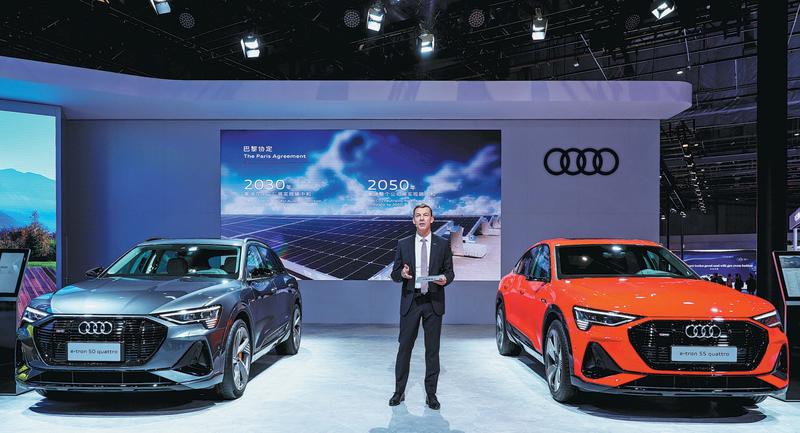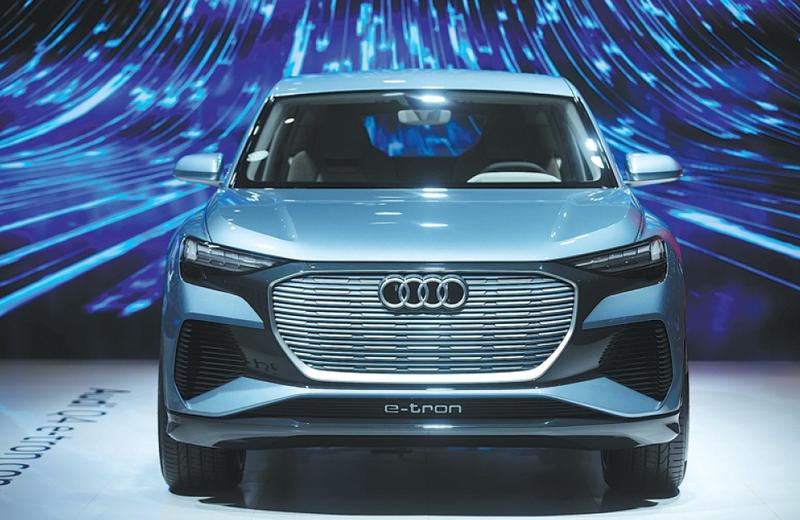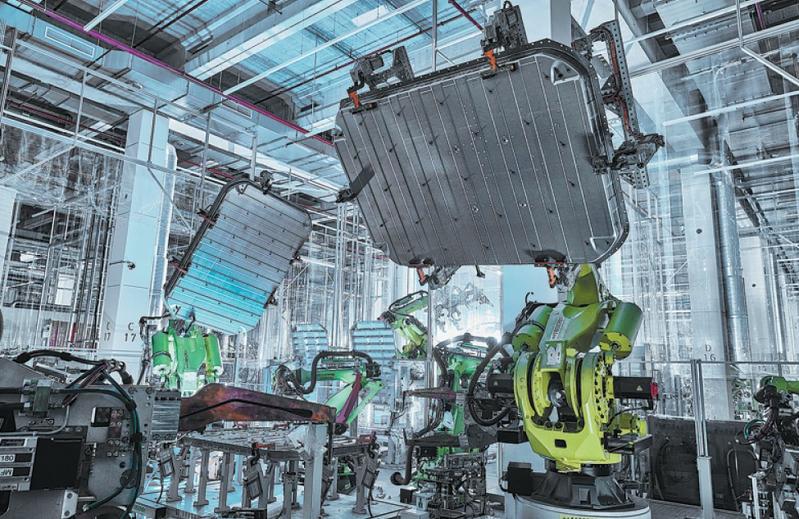 Werner Eichhorn, president of Audi China, delivers a speech at the third China International Import Expo, held from Nov 5-10 in Shanghai. (PHOTO PROVIDED TO CHINA DAILY)
Werner Eichhorn, president of Audi China, delivers a speech at the third China International Import Expo, held from Nov 5-10 in Shanghai. (PHOTO PROVIDED TO CHINA DAILY)
German premium carmaker Audi is launching a sustainability campaign in China, that includes slashing emissions at its plants as well as enriching its lineup of electric models, according to the top executive of the carmaker's operations in China.
The brand with the four rings has pledged to become the leading carbon-neutral premium mobility provider globally.
Audi China President Werner Eichhorn said with its dynamic environmental program, Mission: Zero, the company has committed itself to integrating sustainability into its global corporate strategy.
In China, Audi aims to bring CO2 emissions of its production sites to zero by 2030. Globally, the carmaker is striving to reduce its carbon footprint by around 30 percent in just five years and wants to achieve net zero carbon emissions throughout the company by 2050
As part of the Volkswagen Group, Audi was one of the first companies to commit itself to the goals of the Paris Agreement on climate change, and it has set some ambitious goals for itself as it aims to fulfill this pledge.
Globally, Audi is striving to reduce its carbon footprint by around 30 percent in just five years and wants to achieve net zero carbon emissions throughout the company by 2050.
The German carmaker is taking measures to reduce the carbon footprint of its vehicles even before they travel on the road.
The Audi plant in Brussels, Belgium, where the e-tron and e-tron Sportback are produced, became the first volume production plant in the premium segment worldwide to be certified as CO2-neutral in 2018.
In October this year, Audi's manufacturing facility in Gyor, Hungary, became the carmaker's second carbon-neutral site.
In China, the carmaker aims to bring CO2 emissions of its production sites to zero by 2030, together with its Chinese joint venture FAW-Volkswagen. Eichhorn said the company has started to formulate detailed plans to achieve this target.
ALSO READ: Audi to launch 10 new energy vehicle models in China by 2022
To meet the goal, Audi is tapping the innovative spirit of "vorsprung", meaning progress in German, which has been an inextricable part of the carmaker's DNA for more than a century and has long been Audi's guiding motto.
"Vorsprung will continue to drive us forward in our journey into this new electric era to become the leading carbon-neutral premium provider, here in China and around the world," Eichhorn said.
"By applying our 'vorsprung' spirit to our decarbonization efforts. Audi is merging the new world of electric mobility with more than a century of experience in premium vehicle manufacturing."
 This undated photo shows an Audi e-tron, the brand's first fully-electric series production model. (PHOTO PROVIDED TO CHINA DAILY)
This undated photo shows an Audi e-tron, the brand's first fully-electric series production model. (PHOTO PROVIDED TO CHINA DAILY)
Besides cutting emissions at its plants, Audi is speeding up efforts to enrich its lineup of new energy vehicles in China, which is the largest auto market worldwide and the largest market for Audi.
During the China International Import Expo which concluded last week, Audi showcased three iconic models in its e-tron family: the locally-produced e-tron, the e-tron Sportback and the Q4 e-tron concept.
The Audi e-tron, the brand's first fully-electric series production model, is the centerpiece of this electric transformation.
"The e-tron will be the Audi icon in the sustainable mobility era," Eichhorn said. The localized version is being produced in Changchun, capital of Jilin province, where FAW-Volkswagen is headquartered, and will be available to Chinese customers beginning early 2021.
Audi said the e-tron Sportback will be imported to China starting from early next year.
Another highlight during this year's CIIE, the Q4 e-tron concept, a compact SUV, will be Audi's first electric model built on Volkswagen Group's MEB platform. The MEB platform has been developed solely for electric vehicles.
The carmaker said the concept car is nearing production and will be coming to China soon. And it will be locally produced with FAW-Volkswagen in the near future.
 This undated photo shows Audi's Brussels plant in Belgium, where the e-tron is produced, is certified as carbon-neutral in 2008. (PHOTO PROVIDED TO CHINA DAILY)
This undated photo shows Audi's Brussels plant in Belgium, where the e-tron is produced, is certified as carbon-neutral in 2008. (PHOTO PROVIDED TO CHINA DAILY)
Under Audi's electric mobility strategy, Roadmap E, Audi globally will have 30 e-models by 2025, and those will then comprise around a 40 percent share of the carmaker's total global sales.
READ MORE: Audi leads in automated driving, but others wary to follow
The brand has begun its electric product offensive in China, the largest market for new energy vehicles since it overtook the United States in 2015.
The locally-produced Q2L e-tron and the imported e-tron model have been available to Chinese customers since 2019.
By 2022, Audi will launch another six new energy vehicle models, including the locally-produced e-tron and e-tron Sportback together with partner FAW.
To further enhance the appeal of its electric lineup, the German carmaker recently signed a memorandum of understanding with FAW for the joint production of electric vehicles based on the Premium Platform Electric, which was developed jointly by Porsche and Audi.
Audi said the first new electric models on this platform are expected to be produced beginning in 2024.


